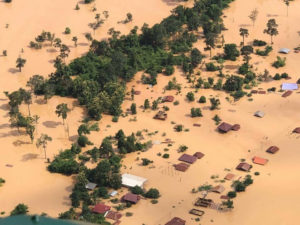Un barrage s’est effondré lundi soir 23 juillet dans la province d’Attapeu, au Laos. La catastrophe s’est produite dans le district de Sanamxay, un district qui jouxte le Cambodge. Situé à l’ouest de la capitale provinciale, ce district a été le premier où le SFE ait travaillé dans cette province, en dehors de l’hôpital provincial où il a commencé son action.
L’inondation a touché 7 villages et affecté près de 12’000 personnes.
Les premiers secours sont gérés par les services de l’État.
Le SFE et d’autres ONG vont être impliqués à moyen terme au secours de ces milliers de familles qui ont tout perdu. Nous sollicitons des dons spécifiques pour cette action d’urgence, qui va s’étaler sur plusieurs mois, pour permettre au SFE d’apporter sa contribution aux sinistrés.
Avec la saison des pluies, ces rescapés se retrouvent donc dans une situation extrêmement vulnérable. Nos équipes ont décidé de soutenir les efforts des secours et d'accompagner les autorités pour aller prêter main forte sur les lieux de la catastrophe, et pour fournir du matériel de premier secours (filtres à eau, moustiquaires, réchauds, etc...) dans les jours qui viennent.
Quelques photos de l'évacuation et du barrage
Localisation des deux principaux villages touchés:





